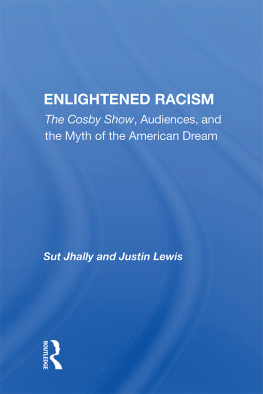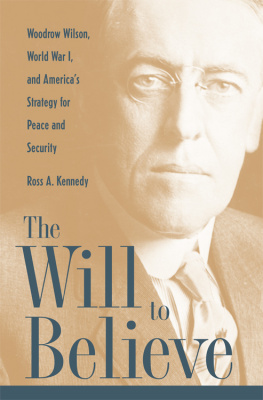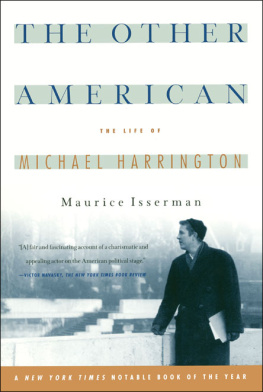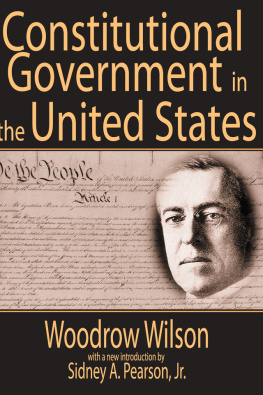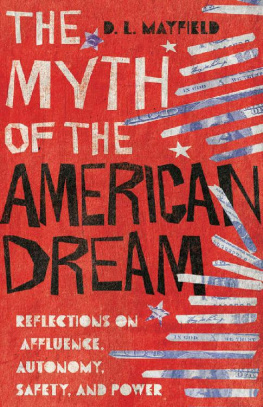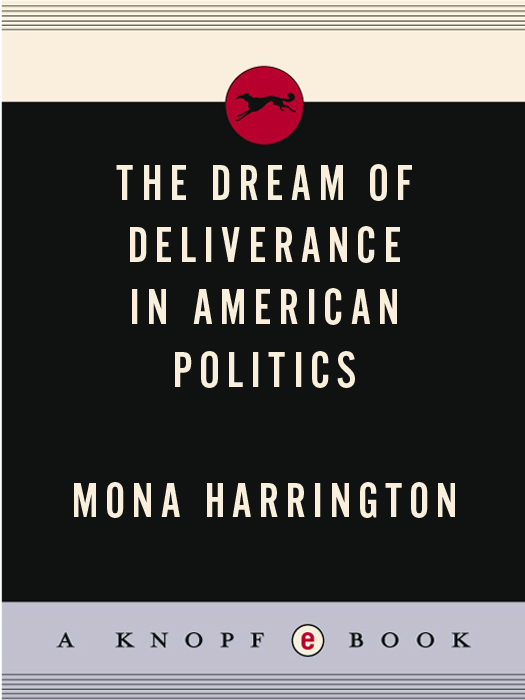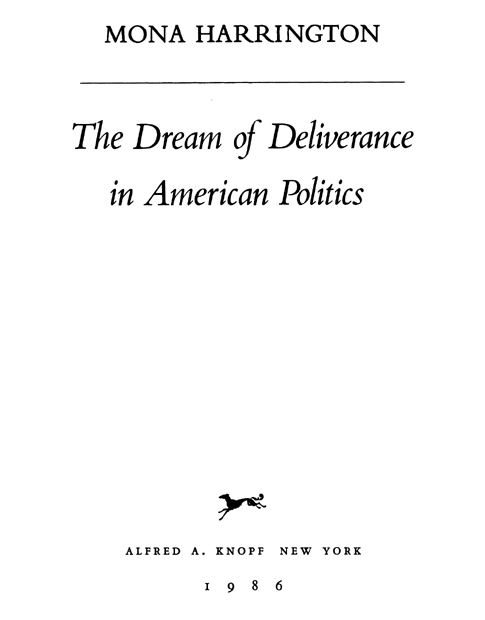THIS IS A BORZOI BOOK
PUBLISHED BY ALFRED A. KNOPF, INC.
Copyright 1986 by Mona Harrington
All rights reserved under International and Pan-American Copyright Conventions. Published in the United States by Alfred A. Knopf, Inc., New York, and simultaneously in Canada by Random House of Canada Limited, Toronto. Distributed by Random House, Inc., New York.
Library of Congress Cataloging-in-Publication Data
Harrington, Mona
The dream of deliverance in American politics.
Bibliography: p.
1. United StatesPolitics and government20th century.
I. Title. II. Title : Deliverance in American politics.
E743.H275 1986 973.92 85-19799
eISBN: 978-0-307-83151-4
v3.1
For Paul
Acknowledgments
Nearly everyone I know has served as listener, reader, or questioner during the evolution of this work. There are some whose contributions were vital to its being done at all.
Thomas N. Brown, professor of American history at the University of Massachusetts/Boston, read every chapter of the last two drafts and offered exquisitely thoughtful and informed comment on each. Equally important, he maintained by both example and counsel the constant conviction that the creation of books is worth the vast labor they require.
I am also profoundly grateful to the Alliance of Independent Scholars, which provides a scholarly community for writers working outside the academic profession. I have presented work in progress to the multidisciplinary research colloquium of the Alliance and received helpful comment on cogency and structural clarity. Co-members of a smaller book-finishers groupNatalie Bluestone, Eugenia Kaledin, and Sherrin Wyntjesprovided continuous support and commentary over the period of a year. Nadya Aisenberg, critical reader par excellence, reviewed large portions of the manuscript. In general, my Alliance colleagues, in their always ready friendship and good spirit, provided a crucial antidote to the isolation of writing.
A number of people contributed special help. Stanley Hoffmann, offered encouragement and important advice in the early stages of the work. Glenn Tinder devoted hours to discussions of political theory, which is the ground of the questions from which the book developed. Arthur Kaledin has carried on a lifelong inquiry with students and friends into the meaning of the American experience, and many of his questionsand answersare woven into these chapters. Frederic Spotts, while laboring on a book of his own, commented on mine with unfailing honesty and humor. And at the end of this process, Jane Garrett, at Alfred A. Knopf, supplied sympathetic and wise suggestions on key points.
Paul Gagnon, to whom this book is dedicated, provided support so multifarious it defies measure and description. My children, Eliza, Benjamin, and Thomas Gagnon asked useful questions, listened to the answers, and also helped to sustain this long effort with crucial cups of tea, jokes, and, perhaps most important, the ordinary exchanges of the day.
Contents









I
The Promise and the Myth
In their morning newspapers on April 29, 1975, Americans read of the final collapse of South Vietnam, its army unable to withstand the combined forces of North Vietnam and the Vietcong despite still massive support from the United States. With defeat imminent, thousands of South Vietnamese who feared communist retribution for their cooperation with the United States had been evacuated in the preceding weeks. Many, however, frantically sought escape at the last minute. Newspapers carried pictures of frightened people trying to climb onto the walls of the American embassy courtyard and Marine guards pushing them off with rifles. Newspaper stories reported that the last American officials in Saigon, trapped in the embassy, retreated to the roof, where they were lifted off by helicopter as the North Vietnamese closed in on the city.
It was a terrible moment, marking terrible failurefailure of American power, failure of American promises, and, for the Vietnamese pushed off the walls, failure of American decency. Twenty years of American aid, ten years of direct involvement in the war, had accomplished nothing, and the cost both to Vietnam and to the United States was incalculable. There were the Vietnamese dead and wounded, not only soldiers but thousands of civilians; the American dead and wounded; a countryside devastated by American bombs and a family and village life destroyed both by bombing and by relocations imposed by anti-guerrilla strategies. Moreover, the economic costsquite apart from how they may be assessed for the Vietnameseincluded an insidious inflation in the United States that greatly weakened the economy at home and unsettled other economies as well by undermining the international strength of the dollar.
After the war, consensus quickly developed that American policy in Vietnam had been disastrously mistaken. But there was no consensus about the nature of the mistake and the lessons to be learned from it. Was the effort in Vietnam well conceived but badly executed through an unwillingness to commit the force the strategy required? Or was the strategy badly conceived to begin with, the enemy misunderstood and the tactics, therefore, doomed to fail?
In either case, the haunting legacy of Vietnam is the widespread belief that the war and its costs in economic and human suffering had all been futile. The father of a Marine killed in the Tet offensive in 1968 expressed this anguish in an interview on the tenth anniversary of his sons death.
All of those kids. All those young kids. How many? Fifty-five thousand? For what? Why? I still dont know. Who did it benefit? The companies that make all the munitions? The people of South Vietnam? Who?
In other American wars, grieving parents understood the reasons for their loss. Some may not have thought the reasons justified the sacrifice of young lives, but the nations purposes were clear and, while challenged and questioned, they were still widely accepted by the public. In both world wars, the United States was fighting to curb expansionist nations with authoritarian governments whose imperial designs threatened the survival of democracy in Europe and an open world order generally. The need to fight in Korea in 1950 was less clear, but it was at least a case of resisting clear-cut military assault across an internationally recognized border. North Korean armies had invaded South Korea and, unresisted, would have extended the area in Asia under communist control. This would have placed non-communist Asian countries, including Japan, under increased pressure to accommodate themselves to demands of communist neighbors or internal communist groups. And such accommodation would reduce the areas of Asia politically friendly and economically open to the West. Thus in all three wars, the United States, the largest, strongest democratic nation in the world, fought either to defend established democracies or to protect the potential, threatened by the spread of communism, for developing democratic systems in underdeveloped areas of the world.


